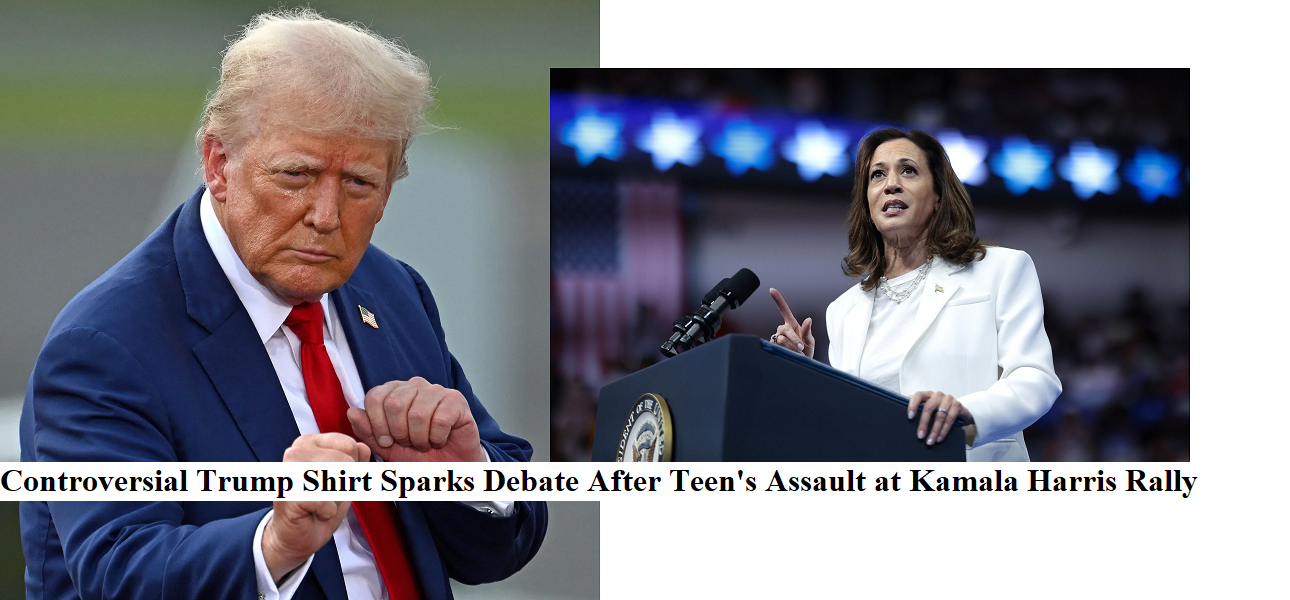Introduction
In the final stretch before election day, a shocking incident at a rally in Stuart, Florida, caught national attention. A 17-year-old wearing a provocative Trump-themed T-shirt was arrested for allegedly assaulting a 70-year-old supporter of Vice President Kamala Harris. The violent encounter has raised questions about political tensions, the power of symbolism in clothing, and the role of law enforcement in managing conflicts at political events. Here’s a closer look at what happened, how the Trump shirt sparked controversy, and the broader implications.
Incident Overview: A Violent Clash in Stuart, Florida
The incident took place in Stuart, a city in Florida, at a rally supporting Vice President Kamala Harris. According to the police report, a 17-year-old boy, dressed in a T-shirt featuring an image of former President Donald Trump raising his middle finger against an American flag backdrop, allegedly punched 70-year-old Kathleen Tomasko. Witnesses stated that the teenager’s actions knocked the elderly woman off her feet.
Law enforcement officials at the event quickly intervened, and the teenager was charged with battery on a person 65 years of age or older, a serious offense in Florida. Brian Bossio, a spokesperson for the Stuart Police Department, confirmed the arrest and noted that police presence was part of the organizers' arrangements to maintain peace at the event.
The Role of the Trump Shirt: Symbolism and Its Power
The T-shirt worn by the teenager has become a focal point in this incident. Featuring Donald Trump gesturing a middle finger, it’s more than just attire—it represents an explicit statement that many interpret as a symbol of defiance or aggression. Clothing with strong political statements, especially during polarized times, can ignite emotions and tensions, especially at public rallies or protests where attendees hold opposing views.
For some Trump supporters, apparel with Trump’s image or slogans like "Make America Great Again" symbolizes loyalty to the former president. However, the imagery on this particular shirt, with Trump showing a middle finger, is more confrontational. It raises questions about the intent behind such choices—whether it’s a means of expressing solidarity or a provocation aimed at political opponents.
Political Apparel: A History of Provocation
Political T-shirts, buttons, and hats are nothing new in American politics. From “I Like Ike” buttons supporting President Dwight D. Eisenhower to the bold “Hope” imagery associated with Barack Obama, symbols on clothing often serve as powerful visual statements. However, in recent years, the messages have become more charged, and in some cases, aggressive.
Trump-themed clothing, in particular, has sparked polarized reactions. While some see it as an expression of patriotism or a demand for change, others view it as emblematic of division. The boy’s choice of shirt, featuring an offensive gesture, underscores how political apparel can escalate tensions—especially in politically charged environments where people may already feel defensive or antagonistic.
Growing Tensions at Political Rallies
As election day approaches, political rallies and events have become common places for conflict, fueled by opposing ideologies. Incidents like this highlight how tensions can flare up with the slightest provocation. This particular rally, intended to support Vice President Kamala Harris, was not expected to attract significant counter-protest. However, the presence of a Trump supporter wearing a confrontational shirt suggests that some attendees may have come with the intent to provoke or disrupt.
Legal Implications of the Incident
In Florida, battery against an individual over 65 is considered a serious offense. The state’s legal system takes such cases seriously, especially in instances where the victim is vulnerable due to age. The 17-year-old, facing legal consequences, could face penalties that include community service, counseling, and potentially more severe punishments depending on his history and the judge’s decision.
Moreover, this case could serve as a reminder for event organizers to anticipate potential conflicts and ensure a balanced police presence. Law enforcement at rallies will likely remain vigilant to avoid further confrontations that could endanger attendees.
Reactions and Responses: The Public Speaks Out
This incident has sparked reactions from both sides of the political spectrum. Many supporters of Kamala Harris and the Biden administration view the altercation as evidence of escalating hostility among Trump supporters. On the other hand, some Trump supporters argue that isolated incidents should not characterize their movement as a whole.
Social media discussions reflect these divided opinions, with some calling for increased tolerance and understanding at political events, while others emphasize the importance of accountability for violence. The role of apparel, specifically the teenager’s T-shirt, has been at the center of discussions, with many debating whether such provocative imagery should be permissible at public rallies.
